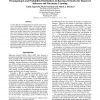Free Online Productivity Tools
i2Speak
i2Symbol
i2OCR
iTex2Img
iWeb2Print
iWeb2Shot
i2Type
iPdf2Split
iPdf2Merge
i2Bopomofo
i2Arabic
i2Style
i2Image
i2PDF
iLatex2Rtf
Sci2ools
104
click to vote
FLAIRS
2006
2006
Decomposing Local Probability Distributions in Bayesian Networks for Improved Inference and Parameter Learning
A major difficulty in building Bayesian network models is the size of conditional probability tables, which grow exponentially in the number of parents. One way of dealing with this problem is through parametric conditional probability distributions that usually require only a linear number of parameters in the number of parents. In this paper we introduce a new class of parametric models, the pICI models, that aim at lowering the number of parameters required to specify local probability distributions, but are still capable of modeling a variety of interactions. A subset of the pICI models are decomposable and this leads to significantly faster inference as compared to models that cannot be decomposed. We also show that the pICI models are especially useful for parameter learning from small data sets and this leads to higher accuracy than learning CPTs.
Artificial Intelligence | Conditional Probability | FLAIRS 2006 | PICI Models | Probability Distributions |
Related Content
| Added | 31 Oct 2010 |
| Updated | 31 Oct 2010 |
| Type | Conference |
| Year | 2006 |
| Where | FLAIRS |
| Authors | Adam Zagorecki, Mark Voortman, Marek J. Druzdzel |
Comments (0)

